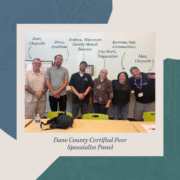Dane County Certified Peer Specialist Panel
On August 14, 2025, an amazing group of Certified Peer Specialists from Dane County gathered for a panel discussion to highlight the varied and impactful work they do in the community. The panel offered insights into their roles, the everyday challenges they face, and the profound value of authentic peer support. The notes below capture the key takeaways from this meaningful conversation.=
Panelist Summaries
- Romona (Safe Communities): Focuses on connecting with peers in their communities, with goals varying for each individual.
- Lisa Marie (Triquestrian): Discussed the concept of “Natural Lifemanshift”—holding space for grief and joy simultaneously. Emphasized that peer support is more necessary than ever and noted the challenges of being seen as an authority in one’s own life, especially in clinical settings.
- Matt (Chrysalis): Works as a Vocational Peer Support specialist, connecting people to their passions and building connections across different systems.
- Andrew (Wisconsin Family Mental Balance): Stressed the value of being able to understand and validate peers’ experiences. Noted the challenges of getting people into peer support training and the isolating experience of being the only peer specialist in a setting.
- Drew (JustDane): Works with justice-involved individuals, providing emotional support and advocacy.
Key Takeaways
- The Value of Peer Support: The panelists consistently emphasized the power of peer support, which involves meeting people where they are, offering authentic connection, and allowing individuals to feel seen and heard. Peer support helps people feel like they belong and reminds them that they are the authority in their own lives.
- Focus on Relationships and Humanity: Several speakers highlighted the importance of a person-centered approach over a metrics-focused one. This means building trusting relationships, holding space for difficult emotions, and acknowledging the shared humanity of everyone involved.
- Challenges in the Field:
- Organizational: Panelists mentioned ongoing struggles with short staffing, funding limitations, and the challenge of integrating peer support into clinical or traditional settings.
- Systemic: Barriers like housing, employment, and navigating complex systems (e.g., criminal justice, mental health) were frequently cited.
- Addressing Burnout and Self-Care: The panelists shared personal strategies for preventing burnout, including regular self-check-ins, doing their own personal work, finding joy in their passions, and recognizing that it’s okay to have a bad day. They also stressed the importance of community care among peer specialists.










